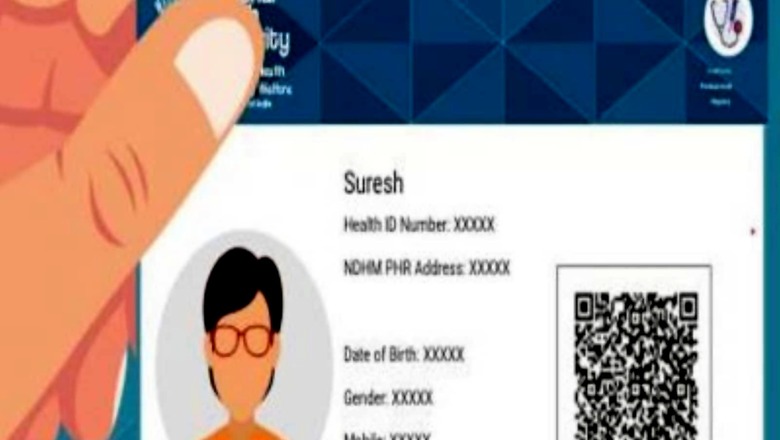
views
The National Health Authority (NHA) on Friday announced the integration of its flagship scheme of Ayushman Bharat Digital Mission (ABDM) with Aarogya Setu. With this, over 21.4 crore Aarogya Setu users will be able to create the 14-digit unique ABHA or Ayushman Bharat Health Account numbers from the mobile app. ABDM has so far generated 16.4 crore ABHA numbers, which will help amplify this further.
In fact, the budget speech by the finance minister, Nirmala Sitharaman, clearly states that the government’s approach in healthcare is now tilted more towards the use of digital technology.
Also Read: Ayushman Bharat: You Can Now Generate Your Aadhaar-Like Unique Health ID Via Aarogya Setu App
While the healthcare budget did not have big announcements, one of the few announcements was on the rollout of the digital ecosystem around the rollout of the ABDM. ABDM aims to develop the backbone necessary to support the integrated digital health infrastructure of the country, whereas the ABHA number is your health ID, through which you can access and share your health records, digitally. It will enable your interaction with doctors and allow you to receive your digital lab reports, prescriptions and other medical reports from hospitals and pathology labs.
Under this scheme, a mobile application for managing your health records is going to be the next most used app in the coming months. However, many of us still don’t know how exactly ABHA works. I will try to simplify it for you as we move forward.
ABHA for You
In short, it’s the name of your 14 digit health ID.
While going to a doctor, you carry bulky files containing your health records and medical history; sharing those records and complete medical information becomes a challenge. The doctor might not get a complete understanding while scanning those physical documents, it’s a hard task. Imagine, if technology enables you to share your medical profile (past medical procedures, medication, diagnosis, allergies) in a single click. Imagine an ecosystem that gives you control and flexibility of digitally providing full or limited time-bound access to your medical history. That’s what ABHA will do for you – keeping all your medical information corroborated at one place, whether it is from your next-door clinic or the hospital you visited for a procedure.
ABHA will also empower doctors with accurate information to enable informed decision-making while deciding your prescription. Patients (also in rural areas) can consult doctors across India, hence saving time, money, and also getting faster and more effective treatments through the discovery rails of ABDM. Healthcare interoperability can lower the total cost of care by reducing the number of unnecessary or repeated tests and helping clinicians make diagnoses sooner. And all this will facilitate through secure, encrypted and completely private interfaces with user consent at the heart of it. Think of how UPI has changed the way we pay today, ABHA will change how healthcare is delivered.
ABDM will create an ecosystem that will fundamentally drive convenience and better health outcomes for us all at a far lower cost and larger scale.
ABHA for Nation
Overall, in an aerial view, health is at the core of Sustainable Development Goals (SDGs). Under the SDG target, India aims to achieve “universal health coverage” which includes protection from financial risks, access to essential health care services, and access to safe, effective, quality, and affordable essential medicines and vaccines for all. ABDM will push India towards Universal Health Coverage as the creation of ABHA is just one small part of the humongous program that aims to bring the country’s entire healthcare on a single platform.
Moving forward, the healthcare information gathered through the scheme will show better quality of macro and micro-level data which will assist policymakers with advanced analytics, appropriate usage of health biomarkers to offer better preventive healthcare. It will also help in decision-making to inform, design and strengthen the implementation of health programmes and policies. The data at pure anonymized levels will further strengthen the private and public research facilities to evaluate the effectiveness of various healthcare programs and facilitate a comprehensive feedback loop between researchers, policymakers, and providers.
The healthcare industry in India is projected to reach $372 billion by 2022 according to a report from Invest India, and the digital mission will play a key role in driving the momentum.
ABHA for Healthtech Companies
You won’t be surprised if I tell you that we don’t have enough doctors per 1000 population. The load on the medical fraternity, including nurses, is huge, and there is a shortage of doctors, especially in rural areas.
In a country like India which is the second largest in terms of the density of population, technology is the only answer to increase access to healthcare services at reasonable prices.
According to the government’s vision, ABHA will bridge the existing gap amongst different stakeholders of the healthcare ecosystem through digital highways. Innovations around storage and access to medical information will appear to drive better outcomes for care-seekers.
While some other tech companies are trying to bring revolution in the vastly evolving arena of healthcare, at EkaCare we have created an ecosystem that enables patients to connect with verified doctors. EkaCare – one of the first companies working with the government in developing the digital interface to create ABHA or health IDs, and manage health records– is offering technology for seamless consultation experience and storage of medical records. As more and more people will create ABHA, patients can connect with doctors via our app and share their medical records with a click.
More than a million ABHA have been created so far via EkaCare, which clearly shows that citizens in India are looking forward to becoming a part of the government initiative. It’s an exciting time as India has just started experiencing the health-tech revolution.
Vikalp Sahni is the Founder and CEO of Eka Care (Connected Health). He is also a Volunteer Architect Aarogya Setu, and Ex-CTO, Co-Founder at GoIbibo. The views expressed in this article are those of the author and do not represent the stand of this publication.
Read all the Latest Opinions here


















Comments
0 comment